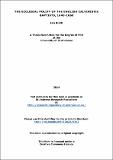Files in this item
The ecclesial polity of the English Calvinistic Baptists, 1640-1660
Item metadata
| dc.contributor.advisor | Holmes, Stephen R. | |
| dc.contributor.author | Birch, Ian J. | |
| dc.coverage.spatial | 257 | en_US |
| dc.date.accessioned | 2015-03-26T15:44:00Z | |
| dc.date.available | 2015-03-26T15:44:00Z | |
| dc.date.issued | 2014-06-23 | |
| dc.identifier.uri | https://hdl.handle.net/10023/6362 | |
| dc.description.abstract | The subject treated in this thesis is the doctrine of the church among the English Calvinistic Baptists in the period, circa 1640-1660. This timeframe covers the significant phase of early Calvinistic Baptist emergence in society and literary output. The thesis seeks to explore the development of theological commitments regarding the nature of the church within the turbulent historical context of the time. The background to the emergence of the Calvinistic Baptists was the demise of the Anglican Church of England, the establishment by Act of Parliament of the Westminster Assembly of Divines, and the establishment of a Presbyterian Church of England. The English experiment with Presbyterianism began and ended in the years covered in this work. Ecclesiology was thus one of the most important doctrines under consideration in the phase of English history. This thesis is a contribution to understanding alternative forms of ecclesiology outside of the mainstream National Church settlement. It will be argued in this thesis that the emergence and development of Calvinistic Baptist ecclesiology was a natural development of one stream of Puritan theology of the church. This was the tradition associated with Robert Brown, and the English separatist movement dating from the 1570s. This tradition was refined and made experimental in the work of Henry Jacob. Having developed his ecclesiology in the Netherlands, in 1616 Jacob founded a congregation in Southwark, London from which Calvinistic Baptists would emerge with distinct baptismal convictions by 1638. Central to Jacob’s ideology was the belief that a rightly ordered church acknowledged Christ as King over his people. The Christological priority of early Calvinistic Baptist ecclesiology will constitute the primary contribution of this thesis to investigation of dissenting theology in the period. | en_US |
| dc.language.iso | en | en_US |
| dc.publisher | University of St Andrews | |
| dc.rights | Creative Commons Attribution-NonCommercial-NoDerivatives 4.0 International | |
| dc.rights.uri | http://creativecommons.org/licenses/by-nc-nd/4.0/ | |
| dc.subject | Baptist | en_US |
| dc.subject | Calvinistic | en_US |
| dc.subject | Ecclesiology | en_US |
| dc.subject | Seventeenth century | en_US |
| dc.subject | Henry Jacob | en_US |
| dc.subject | Thomas Collier | en_US |
| dc.subject | Baptist associationalism | en_US |
| dc.subject | Christology | en_US |
| dc.subject | Baptist confessions | en_US |
| dc.subject | Baptism | en_US |
| dc.subject | Disputations | en_US |
| dc.subject | Discipline | en_US |
| dc.subject | Doctrine of church | en_US |
| dc.subject.lcsh | Baptists--Doctrines--History | en_US |
| dc.subject.lcsh | Calvinism | en_US |
| dc.subject.lcsh | Church history--17th century | en_US |
| dc.title | The ecclesial polity of the English Calvinistic Baptists, 1640-1660 | en_US |
| dc.type | Thesis | en_US |
| dc.type.qualificationlevel | Doctoral | en_US |
| dc.type.qualificationname | PhD Doctor of Philosophy | en_US |
| dc.publisher.institution | The University of St Andrews | en_US |
This item appears in the following Collection(s)
Except where otherwise noted within the work, this item's licence for re-use is described as Creative Commons Attribution-NonCommercial-NoDerivatives 4.0 International
Items in the St Andrews Research Repository are protected by copyright, with all rights reserved, unless otherwise indicated.


